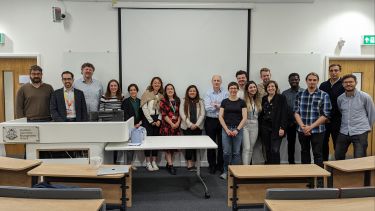Organised by Dr Erica Ballantyne, Head of the OMDS Research Centre, and Dr Marek Szwejczewski, Research Development Director at OMDS, the conference was an opportunity for PhD researchers to present their leading research to peers and senior academics.
The conference presentations ranged from dealing with the problem of evacuation locations in humanitarian operations, to determining energy usage of public service vehicles in the urban environment. The presentations were followed by a lively debate about the issues concerned and especially the practical application and implications of the work.
The presentations included:
Xiaochen Feng - The Quickest Evacuation Location Problem (QELP) in Humanitarian Operations: an introduction
This presentation introduced and discussed a novel Quickest Evacuation Location Problem in Humanitarian Operations, aiming at increasing the efficiency of humanitarian operations and enhancing evacuation networks' design and planning.
Thomas McKinney - Using lifestyle scenarios to investigate electric vehicle impacts in UK rural areas
Thomas McKinney spoke about using lifestyle scenarios and household compositions to inform an activity based travel demand model in order to predict vehicle usage for rural demographics. Combined with a detailed EV Charging model, from both an energy and power perspective, home charging would have to maintain these travel patterns.
Ginar Santika Niwanputri - What is a cognitive tool?
As an indispensable part of human life, the availability of tools for supporting cognitive work is still distant from sufficient, like how physical work has been facilitated. A systematic literature review has been conducted to define cognitive tools: technology-based resources that facilitate mental processes such as learning and knowledge comprehension, which aid users in externalising information at appropriate levels of details to support communication and representation.
Tudor Stincescu - Assessing Energy Usage of Public Service Vehicles in Urban Areas
The presentation showcased research concerning energy of an eRCV fleet. Preliminary results indicate that an electric vehicle fleet purposed for refused collection may be a viable alternative to a traditional diesel fleet, with significantly reduced carbon dioxide emissions and decreased energy refill and maintenance costs.

